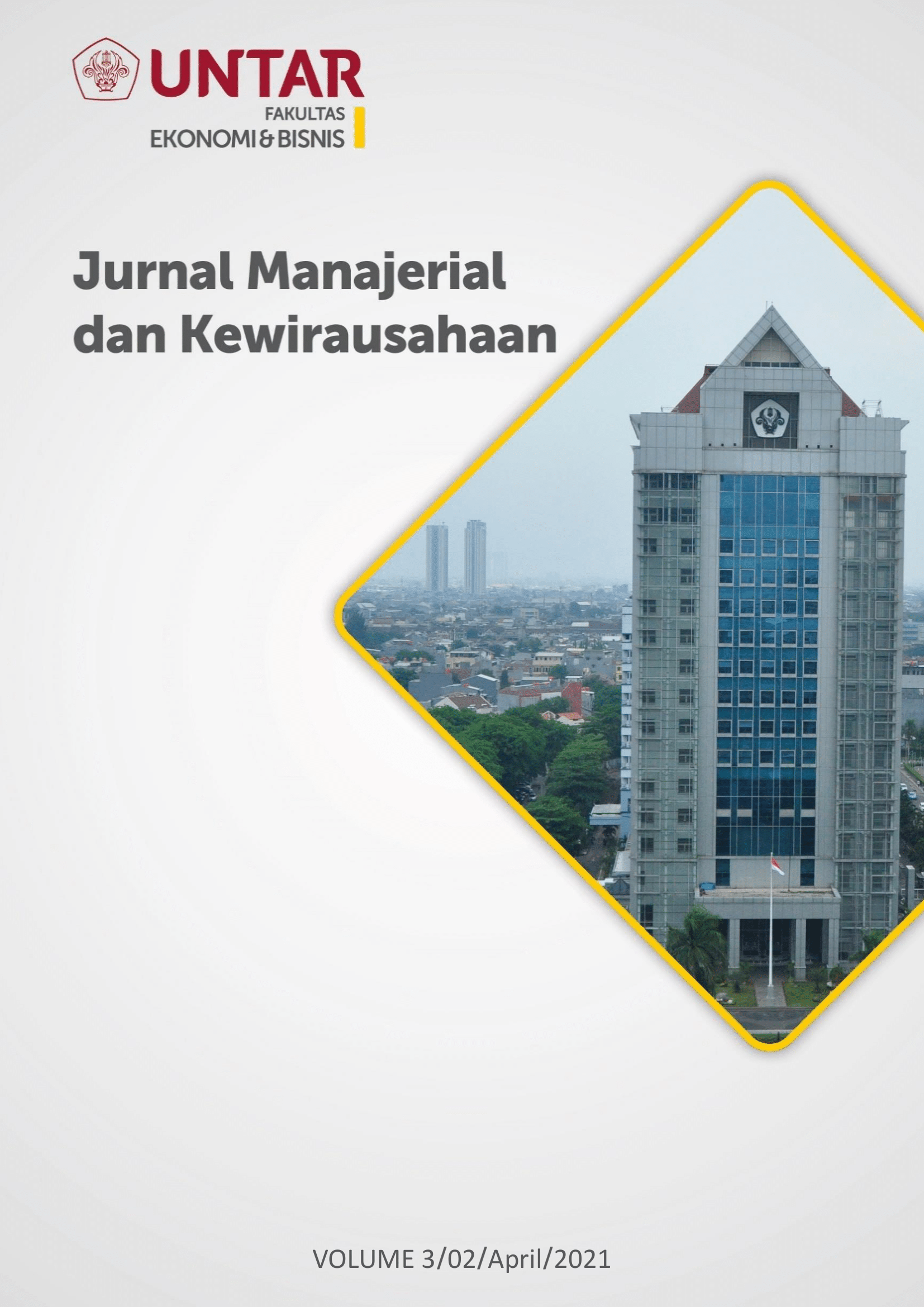Pengaruh Perceived Entrepreneurial Feasibility Dan Attitude Terhadap Niat Kewirausahaan Yang Berorientasi Berkelanjutan
Main Article Content
Abstract
The purpose of this study was to test empirically the effect of perceived entrepreneurial feasibility and attitude towards entrepreneurial intentions with a sustainable orientation. The population of this study was students of the Universitas Tarumanagara, Faculty of Economics and Business. The number of sample used in this study was 170 respondents. The sampling technique used was non probability sampling with purposive sampling method. Overall the results and conclusions of this study are: 1) Perceived entrepreneurial feasibility has a positive and significant effect on entrepreneurial intentions that are oriented sustainably on students of the Tarumanagara University’s Economics and Business Faculty. 2) Attitude has a positive and significant effect on entrepreneurial intentions that are oriented sustainably on the students of the Tarumanagara University’s Economics and Business Faculty.
Tujuan penelitian ini adalah untuk menguji secara empiris mengenai pengaruh perceived entrepreneurial feasibility dan attitude terhadap niat kewirausahaan yang berorientasi berkelanjutan. Populasi dalam penelitian ini adalah Mahasiswa/I Fakultas Ekonomi dan Bisnis Universitas Tarumanagara. Sampel yang digunakan pada penelitian ini yaitu 170 reponden. Teknik pengambilan sampel yang digunakan yaitu non probability sampling dengan metode pengambilan sampel purposive sampling. Secara keseluruhan hasil dan kesimpulan dari penelitian ini yaitu: 1) Perceived entrepreneurial feasibility berpengaruh positif dan signifikan terhadap niat kewirausahaan yang berorientasi berkelanjutan pada Mahasiswa/I Fakultas Ekonomi dan Bisnis Univeristas Tarumanagara. 2) Attitude berpengaruh positif dan signifikan terhadap niat kewirausahaan yang berorientasi berkelanjutan pada Mahasiswa/I Fakultas Ekonomi dan Bisnis Univeristas Tarumanagara.
Article Details
Section
This work is licensed under a Jurnal Muara Ilmu Ekonomi dan Bisnis Creative Commons Attribution-ShareAlike 4.0 International License.,/p>
References
Amelinda, R., Prasodjo, I., Nuringsih, K., & Nuryasman, M. N. (2019). Sustainable entrepreneurial intention: The perceived of triple bottom line among female students. Jurnal Manajemen, 23(2), 168. https://doi.org/10.24912/jm.v23i2.472
BPS. (2019, July 15). Badan Pusat Statistik. https://www.bps.go.id/pressrelease/2019/07/15/1629/persentase-pendudukmiskin-maret-2019-sebesar-9-41-persen.html
BPS. (2020, November 5). Data BPS: Jumlah Pengangguran Bertambah 2,67 Juta orang. Merdeka.com. https://www.merdeka.com/uang/data-bps-jumlah-pengangguranbertambah-267-juta-orang.html
Cohen, B. and Winn, M. I. (2007). Market imperfections, opportunity and sustainable entrepreneurship. Journal of Business Venturing, Vol. 22, No. 1, pp. 29-49.
Dissanayake, D. (2014). The impact of perceived desirability and perceived feasibility on entrepreneurial intention among undergraduate students in Sri Lanka: An extended model. Kelaniya Journal of Management, 2(1), 39. https://doi.org/10.4038/kjm.v2i1.6543
Eagly, Chaiken, & Sarlito. (1992). OPAC - Universitas Indonesia Library. https://lib.ui.ac.id/file?file=digital/125235-152.4%20KHA%20p%20-%20Perbedaan%20sikap%20-%20Literatur.pdf
Fellnhofer, K., Puumalainen, K., & Vuorio, A. M. (2018). Drivers of entrepreneurial intentions in sustainable entrepreneurship. International Journal of Entrepreneurial Behavior & Research, 24(2), 359-381. https://doi.org/10.1108/ijebr-03-2016-0097
Ghozali. (2018, August 25). Partial least Square. Uji Statistik. https://www.statistikian.com/2018/08/pengertian-partial-least-square-pls.html
Hidayati, N. (2013, March 20). https://core.ac.uk/download/pdf/234031768.pdf
Hockerts, Wüstenhagen, Pacheco, Shepherd, & Patzelt. (2010). Neliti. https://media.neliti.com/media/publications/170968-ID-pemuda-indonesia-dankewirausahaan-sosia.pdf
Kuckertz, A., & Wagner, M. (2010). The influence of sustainability orientation on entrepreneurial intentions — Investigating the role of business experience. Journal of Business Venturing, 25(5), 524-539. https://doi.org/10.1016/j.jbusvent.2009.09.001
Krueger, C., Shapero, B., & Sokol, A. (1993). Drivers of entrepreneurial intentions in sustainable entrepreneurship. International Journal of Entrepreneurial Behavior & Research, 24(2), 359-381. https://doi.org/10.1108/ijebr-03-2016-0097
Liñan, & Fayolle. (2015). Drivers of entrepreneurial intentions in sustainable entrepreneurship. International Journal of Entrepreneurial Behavior & Research, 24(2), 359-381. https://doi.org/10.1108/ijebr-03-2016-0097
Mair, B., & Noboa, G. (2006). Valuasi kesadaran lingkungan, corporate social responsibility terhadap kualitas laba dengan moderasi komite audit. Jurnal Ekonomi dan Bisnis, 21, 97-114. https://doi.org/10.17528/cifor/001641
Marco, L. (2019). Pengaruh orientasi pasar dan orientasi kewirausahaan terhadap kinerja UMKM pada bidang variasi mobil di mega glodok kemayoran jakarta pusat. International Journal of Retail & Distribution Management, 43, 280-596.
Muselman. (2009). Drivers of entrepreneurial intentions in sustainable entrepreneurship. International Journal of Entrepreneurial Behavior & Research, 24(2), 359-381. https://doi.org/10.1108/ijebr-03-2016-0097
Noboa, G., & Mair, B. (2006). Valuasi kesadaran lingkungan, corporate social responsibility terhadap kualitas laba dengan moderasi komite audit. jurnal ekonomi dan bisnis, 21, 97-114. https://doi.org/10.17528/cifor/001641
Notoatmodjo. (2017, July 31). Penjelasan Teknik purposive sampling Secara detail. Uji Statistik. https://www.statistikian.com/2017/06/penjelasan-teknik-purposivesampling.html
Phan, H., & Moriano, H. G. (n.d.). Neliti. https://media.neliti.com/media/publications/254988-pengaruh-sikap-pendidikan-dan-lingkungan-6c398169.pdf
Prasodjo, I., Amelinda, R., Nuringsih, K., & Nuryasman, M. N. (2019). Sustainable entrepreneurial intention: The perceived of triple bottom line among female students. Jurnal Manajemen, 23(2), 168. https://doi.org/10.24912/jm.v23i2.472
Priyanto, M. (2008). Neliti. https://media.neliti.com/media/publications/220474-analisisfaktor-faktor-yang-mempengaruhi.pdf
Puspayoga, A. G. (2020, October 20). Jumlah Pengusaha Di Indonesia Meningkat, TAPI... KoinWorks Blog. https://koinworks.com/blog/jumlah-pengusaha-di-indonesiameningkat/
Puumalainen, K., Vuorio, A. M., & Fellnhofer, K. (2018). Drivers of entrepreneurial intentions in sustainable entrepreneurship. International Journal of Entrepreneurial Behavior & Research, 24(2), 359-381. https://doi.org/10.1108/ijebr-03-2016-0097
Ramaday. (2014). Neliti. https://media.neliti.com/media/publications/254696-pengaruh-sikapmotivasi-dan-lingkungan-t-256236f5.pdf
Rosana, M. (2018). KEBIJAKAN PEMBANGUNAN BERKELANJUTAN YANG BERWAWASAN LINGKUNGAN DI INDONESIA. Jurnal ilmu sosial, 1. https://doi.org/10.17528/cifor/001641
Shapero, R., & Sokol, D. (2006) Valuasi kesadaran lingkungan, corporate social responsibility terhadap kualitas laba dengan moderasi komite audit. jurnal ekonomi dan bisnis, 21, 97-114. https://doi.org/10.17528/cifor/001641
Solesvik, G. (2020). Neliti. https://media.neliti.com/media/publications/221197-keterkaitanpengalaman-kewirausahaan-sik.pdf
Vuorio, A. M., Puumalainen, K., & Fellnhofer, K. (2018). Drivers of entrepreneurial intentions in sustainable entrepreneurship. International Journal of Entrepreneurial Behavior & Research, 24(2), 359-381. https://doi.org/10.1108/ijebr-03-2016-0097
Witjaksono, R. B., & Djaddang, S. (2018). Valuasi kesadaran lingkungan, corporate social responsibility terhadap kualitas laba dengan moderasi komite audit. jurnal ekonomi dan bisnis, 21, 97-114. https://doi.org/10.17528/cifor/001641
Winn, V., Cohen, C., Dean, G., McMullen, G., & Hockerts, H. (n.d.). Simple search. https://www.diva-portal.org/smash/get/diva2:711153/FULLTEXT01.pdf

